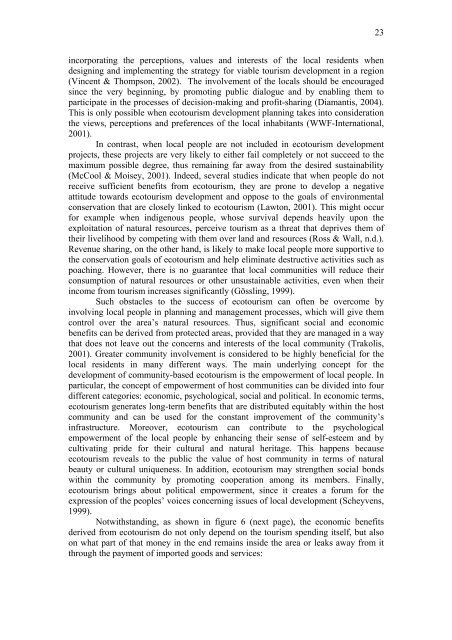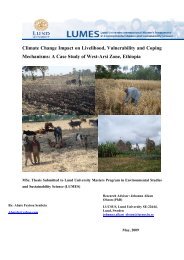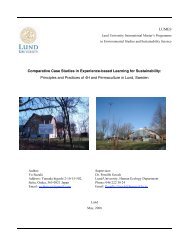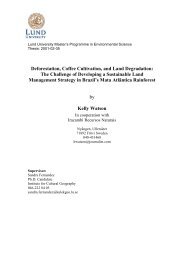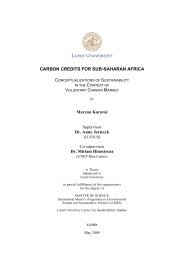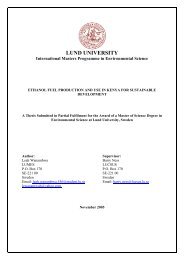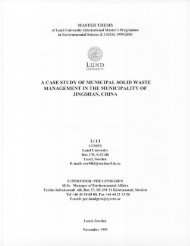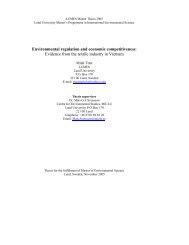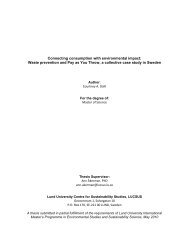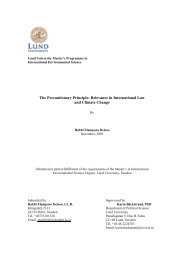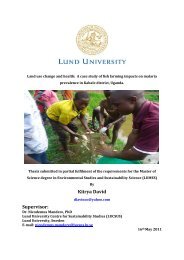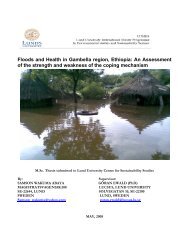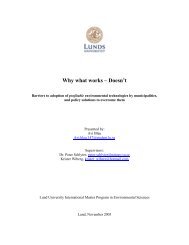Thesis title: âThe development of community-based ecotourism - lumes
Thesis title: âThe development of community-based ecotourism - lumes
Thesis title: âThe development of community-based ecotourism - lumes
You also want an ePaper? Increase the reach of your titles
YUMPU automatically turns print PDFs into web optimized ePapers that Google loves.
incorporating the perceptions, values and interests <strong>of</strong> the local residents whendesigning and implementing the strategy for viable tourism <strong>development</strong> in a region(Vincent & Thompson, 2002). The involvement <strong>of</strong> the locals should be encouragedsince the very beginning, by promoting public dialogue and by enabling them toparticipate in the processes <strong>of</strong> decision-making and pr<strong>of</strong>it-sharing (Diamantis, 2004).This is only possible when <strong>ecotourism</strong> <strong>development</strong> planning takes into considerationthe views, perceptions and preferences <strong>of</strong> the local inhabitants (WWF-International,2001).In contrast, when local people are not included in <strong>ecotourism</strong> <strong>development</strong>projects, these projects are very likely to either fail completely or not succeed to themaximum possible degree, thus remaining far away from the desired sustainability(McCool & Moisey, 2001). Indeed, several studies indicate that when people do notreceive sufficient benefits from <strong>ecotourism</strong>, they are prone to develop a negativeattitude towards <strong>ecotourism</strong> <strong>development</strong> and oppose to the goals <strong>of</strong> environmentalconservation that are closely linked to <strong>ecotourism</strong> (Lawton, 2001). This might occurfor example when indigenous people, whose survival depends heavily upon theexploitation <strong>of</strong> natural resources, perceive tourism as a threat that deprives them <strong>of</strong>their livelihood by competing with them over land and resources (Ross & Wall, n.d.).Revenue sharing, on the other hand, is likely to make local people more supportive tothe conservation goals <strong>of</strong> <strong>ecotourism</strong> and help eliminate destructive activities such aspoaching. However, there is no guarantee that local communities will reduce theirconsumption <strong>of</strong> natural resources or other unsustainable activities, even when theirincome from tourism increases significantly (Gössling, 1999).Such obstacles to the success <strong>of</strong> <strong>ecotourism</strong> can <strong>of</strong>ten be overcome byinvolving local people in planning and management processes, which will give themcontrol over the area’s natural resources. Thus, significant social and economicbenefits can be derived from protected areas, provided that they are managed in a waythat does not leave out the concerns and interests <strong>of</strong> the local <strong>community</strong> (Trakolis,2001). Greater <strong>community</strong> involvement is considered to be highly beneficial for thelocal residents in many different ways. The main underlying concept for the<strong>development</strong> <strong>of</strong> <strong>community</strong>-<strong>based</strong> <strong>ecotourism</strong> is the empowerment <strong>of</strong> local people. Inparticular, the concept <strong>of</strong> empowerment <strong>of</strong> host communities can be divided into fourdifferent categories: economic, psychological, social and political. In economic terms,<strong>ecotourism</strong> generates long-term benefits that are distributed equitably within the host<strong>community</strong> and can be used for the constant improvement <strong>of</strong> the <strong>community</strong>’sinfrastructure. Moreover, <strong>ecotourism</strong> can contribute to the psychologicalempowerment <strong>of</strong> the local people by enhancing their sense <strong>of</strong> self-esteem and bycultivating pride for their cultural and natural heritage. This happens because<strong>ecotourism</strong> reveals to the public the value <strong>of</strong> host <strong>community</strong> in terms <strong>of</strong> naturalbeauty or cultural uniqueness. In addition, <strong>ecotourism</strong> may strengthen social bondswithin the <strong>community</strong> by promoting cooperation among its members. Finally,<strong>ecotourism</strong> brings about political empowerment, since it creates a forum for theexpression <strong>of</strong> the peoples’ voices concerning issues <strong>of</strong> local <strong>development</strong> (Scheyvens,1999).Notwithstanding, as shown in figure 6 (next page), the economic benefitsderived from <strong>ecotourism</strong> do not only depend on the tourism spending itself, but alsoon what part <strong>of</strong> that money in the end remains inside the area or leaks away from itthrough the payment <strong>of</strong> imported goods and services:23


